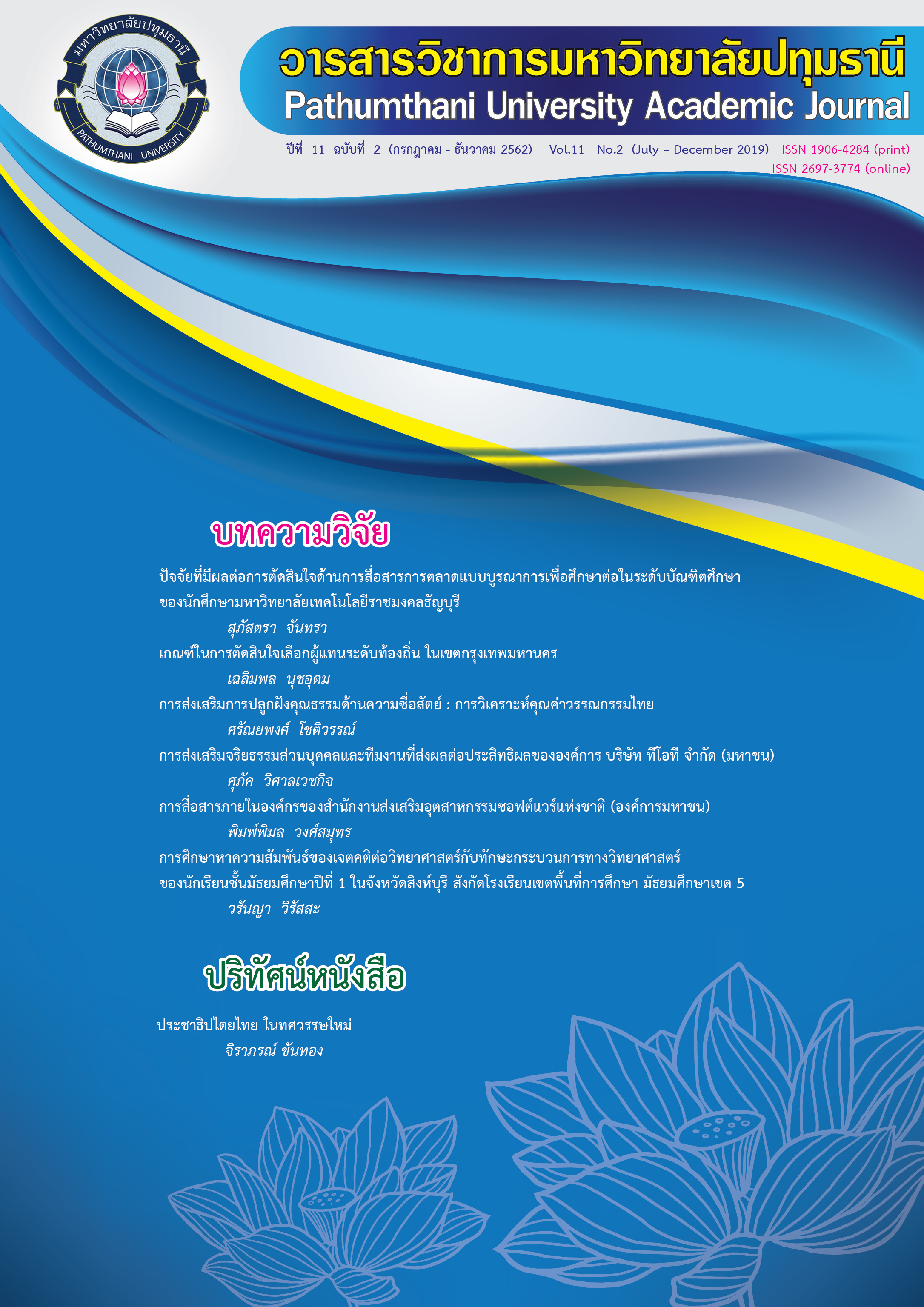Sustainable weste Problems management Of Koh Samui Manicipality, Suratthani
Keywords:
Conditions and need for waste management/People’s participation in waste managementAbstract
The objectives of this research were study conditions and needs for waste management, and to study the waste management of the municipality of Koh Samui, Surat Thani. The population was divided into 2 groups: 1) The people lived in the municipality of Koh Samui, Surat Thani, 7 sub-districts 61,318. Then 382 samples were obtained from Waer's calculations, The tool were used as the questionnaire. 2) The responsible for waste management officers in the municipality of Koh Samui were the community leader of Koh Samui municipality. public health and environmental 3 persons ,and the 3 staffs of the municipality of Koh Samui by using a specific sampling method. The instruments used for data collection were semi-structured interviews. Quantitative data analyzed from questionnaire by frequency, percentage, mean and standard deviation, and inferential statistics. Qualitative information from the interview analyzed by the classification of data interpretation of acquired data, content analysis, descriptive analysis and multiple regression analysis for hypothesis testing. The study indicated that 1. Respondents mostly were female, aged 31-40 years, household status as a resident and household members: 3-4 persons and average monthly income 10,001-15,000 Baht. The most common type of household wastes were plastic bag, snack box, foam, foil, and plastic wrap. 2. Problems and needs in waste management that affect household solid waste management needs, should be focus on the availability of materials, personnel, priorities, processes / procedures. And the importance of the impact on people and the environment will increase the problem of waste management in the waste. And the demand for waste management has decreased. 3. Waste management that affects people's participation in solid waste management in the community was sustainable management: participants in problem solving, waste management in the community, participation in the implementation of community waste management ,work community and waste management.
References
กรมควบคุมมลพิษ กระทรวงทรัพยากรธรรมชาติและสิ่งแวดล้อม. (2541). แนวทางในการลดมลพิษ โครงการพัฒนาของเสีย. กรุงเทพฯ : [ม.ป.พ.].
กรมควบคุมมลพิษ กระทรวงทรัพยากรธรรมชาติและสิ่งแวดล้อม. (2551). แนวทางการลด คัดแยก และใช้ประโยชน์ขยะมูลฝอยมลพิษ : บริษัท รุ่งศิลป์การพิมพ์ (1997)
กรมส่งเสริมการปกครอง ส่วนท้องถิ่น กระทรวงมหาดไทย. (2545). มาตรฐานการจัดการขยะมูลฝอยและสิ่งปฏิกูล กรุงเทพฯ : [ม.ป.พ.].
กรมส่งเสริมคุณภาพสิ่งแวดล้อม กระทรวงวิทยาศาสตร์และเทคโนโลยีและสิ่งแวดล้อม.(2546). รายงานประจำปี 2546. กรุงเทพฯ : กระทรวงวิทยาศาสตร์และเทคโนโลยีและสิ่งแวดล้อม.
การประชุมสภาเทศบาลเมืองเกาะสมุย. (2555). รายงานสมัยวิสามัญ สมัยที่ 4 ครั้งที่ 2 วันจันทร์ที่ 9 มกราคม 2555. สืบค้นจาก www.suratthani.go.th
คณะกรรมการวิจัยแห่งชาติ. (2543). รายงานการวิจัยเรื่อง วิจัยและพัฒนาวิธีการจัดการมูลฝอยที่มีประสิทธิภาพสำหรับเทศบาลตำบลอโยธยา. กรุงเทพฯ : เจริญดีการพิมพ์.
จินตนา ศรีนุกูล. (2535). พฤติกรรมการทิ้งขยะของประชาชน ในเขตรอบนอกกรุงเทพมหานคร.กรุงเทพฯ : [ม.ป.พ.].
จีระชัย ไกรกังวาร. (2544). การมีส่วนร่วมของประชาชนในการจัดการกำจัดขยะมูลฝอยเทศบาลเมืองวารินชําราบ จังหวัดอุบลราชธานี : [ม.ป.พ.].
ชัชกุล รัตนวิบูลย์. (2543). พฤติกรรมการจัดการขยะมูลฝอยของประชาชนในชุมชนเขตสายไหม.กรุงเทพมหานคร : [ม.ป.พ.].
ธงชัยทองทวี. (2553). สภาพปัญหาการจัดการขยะมูลฝอย องค์การบริหารส่วนตำบล หนองขาม อำเภอจักรราช จังหวัดนครราชสีม : [ม.ป.พ.].
บริษัทแมคโครคอนซัลแตนท์ จำกัด และคณะ. (2539) ระบบแยกขยะมูลฝอยเพื่อนำกลับมาใช้ ประโยชน์ของเทศบาลนครราชสีมา : [ม.ป.พ.].
พชรวรรณ ศรีวาลัย. (2542) พฤติกรรมการกำจัดขยะของประชาชน ในชนบทจังหวัดนครนายก. : [ม.ป.พ.].
พิชิต สกุลพรหมณ์. (2531) การสุขาภิบาลสิ่งแวดล้อม.กรุงเทพฯ : [ม.ป.พ.].
สุพจน์ ทรัพย์ผดุงชนม์. (2546) พฤติกรรมการมีส่วนร่วมของประชาชนในการกำจัดขยะมูลฝอย เทศบาลตำบลบ้านฉาง อำเภอบ้านฉาง จังหวัดระยอง : [ม.ป.พ.].
อาณัติ ต๊ะปินตา. (2553) ความรู้เบื้องต้นเกี่ยวกับการจัดการขยะมูลฝอยกรุงเทพมหานคร :จุฬาลงกรณ์มหาวิทยาลัย.
คณะกรรมาธิการกองทุนหมู่บ้าน และชุมชนเมืองแห่งชาติ. (2546) โครงการเพิ่มประสิทธิภาพการบริหารจัดการกองทุนหมู่บ้าน และชุมชนเมือง. กรุงเทพฯ : คุรุสภาลาดพร้าว.
สรรเสริญ วงศ์ชอุ่ม. (2544) เศรษฐกิจพอเพียงพื้นฐานสู่การพัฒนาที่ยั่งยืน. นนทบุรี : เพชรรุ่งการพิมพ์.
พจนา สวนศรี. (2546) คู่มือการจัดการท่องเที่ยวโดยชุมชนโครงการท่องเที่ยวเพื่อชีวิตและธรรมชาติ. กรุงเทพฯ : กองทุนแคนาดาประจำประเทศไทย.
ไพฑูรย์ พงศะบุตร. (2544) พจนานุกรมฉบับที่ 27 กรุงเทพฯ : ไทยวัฒนาพานิช.
สิน สุโรบล. (2546) การท่องเที่ยวโดยชุมชนแนวคิดประสบการณ์พื้นที่ภาคเหนือ. เชียงใหม่: สำนักงานกองทุนสนับสนุนการวิจัย.
“แผนพัฒนาเศรษฐกิจและสังคมแห่งชาติฉบับที่ 9 (พ.ศ 2545 - 2549).”[ออนไลน์]. เข้าถึงได้จาก
www.newth.go.th สืบค้นวันที่ 19 กันยายน พ.ศ.2559.
อรศรี งามวิทยาพงศ์, บรรณาธิการ. (2544) พลังรุ่งอรุณฉบับพิเศษ กรอบแนวคิดและบูรณาการ งานสู่ชีวิต. กรุงเทพฯ : เอ็มเพอเรอร์ พิกรุ๊ป จำกัด.
Abduli, M.A. “Solid Waste Management in Guilan Province, Iran,” Journal of Environmental Environmental Health. June 1, 1997. แหล่งสืบค้น http://www.thefreelibrary.com/Solid+waste+management+in+Guilan+Province+Iran-a019754401> May 13, 2016.
Costanza, Robert. And et al. ( 2000). “Managing Our Environmental Portfolio,”BioScience. 50 (2) : 149 – 154.
Darcey, Sue. (1990). Reduction and Reuse: States Attack Excess Waste. New York The Management of World Waste แหล่งสืบค้น http:www..lib bua.ac.th
/dems/012cha92/chaptey 2. Pdf/ July 6, 2016.
Harris, Janathan M. (2000). “Basic Principles of Sustainable Development,” Global Development and Environment Institute Working. P.5.
Kuniyal. (2005). “Solid Waste Management Techniques for the Waste Generated And Brought Down from Campsites in the Hill Spots, Trails and Expedition Tops”, Journal of Environmental Science 3, June.
Membiela, P. et al. (1993). Student’s preconceptions about urban environment problems and solid waste “The journal of Environmental Education”. 24(2);30 - 34 ,
Onwurah I.N.E., V.N. Oqugua and O.F. Otitoju. “Integrated Environment
Biotechnologyoriented framework for Solid Waste Management and Control in Nigeria,”Int.J.Environment and Waste Management.1(1) : 194-104, 2006.
Proper, Mgaya and Lubomir Nondek .(2004). Disposal frequencies of selected recyclable wastes in Dares Salaam “The journal of Waste Management”. 24(7)
Rathi, S. “Optimization Model for Integrated Municipal Solid Waste Management in Mumbai, India,” Environment and Development Economics. 12 : 105 -121, 2007.
UNDP. (1994). Human Development Report 1994. Newyork : Oxford University.
Downloads
Published
How to Cite
Issue
Section
License
บทความที่ได้รับการตีพิมพ์เป็นลิขสิทธิ์ของวารสารมหาวิทยาลัยปทุมธานี
ข้อความที่ปรากฎในบทความแต่ละเรื่อง เป็นความคิดเห็นส่วนตัวของผู้เขียน กองบรรณาธิการไม่จำเป็นต้องเห็นด้วยเสมอไป และไม่มีส่วนรับผิดชอบใด ๆ ถือเป็นความรับผิดชอบของผู้เขียนแต่เพียงผู้เดียว



